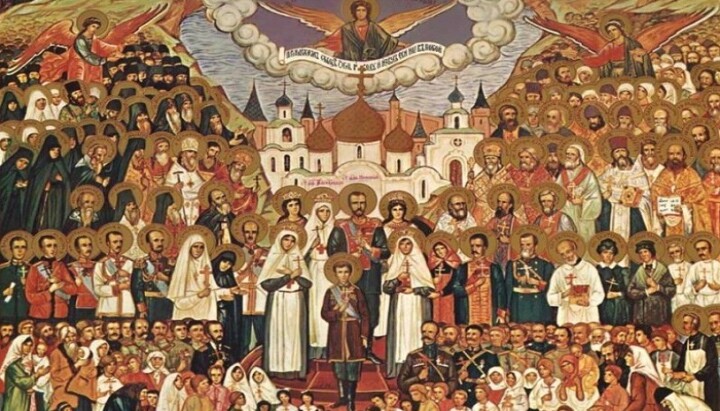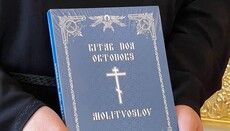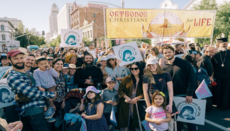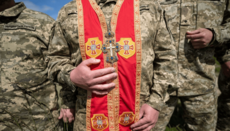ROCOR Synod: ‘Aspects of the Russian State and Society are Wandering Onto an Extremely Dangerous Path’

The Synod of Bishops of the Russian Orthodox Church Outside of Russia has released a statement on the renewal of 20th-century ideologies in Russia. It is published in full below.
NEW YORK — The Synod of Bishops of the Russian Orthodox Church Outside of Russia finds it necessary to raise its voice out of bitter necessity, for we find that in a time of crisis and growing confrontation amongst nations, aspects of the Russian state and society are wandering onto an extremely dangerous path: instead of the promulgation of Christian repentance and purification, we observe in certain circles a return to a false, God-opposing ideology that prevailed in the last century. This return is fraught with harmful consequences. Should it continue, we fear that modern Russia risks being considered a dark stain amongst the nations, marked by a revival of spiritual corruption, instead of her being a radiant beacon of Orthodox Truth, which is surely the calling to which her long history of Christian piety directs her.
In 1981, our Russian Orthodox Church Outside of Russia glorified the full host of the holy New Martyrs and Confessors of Russia. Later, the Moscow Patriarchate followed this example, having undergone a difficult journey in the twentieth century. But official positions within Russia towards her history have more recently been changing. The state document, “The Concept of State Policy on the Commemoration of the Victims of Political Repression,” which concerns those condemned under the Communist regime, was revised in 2024, evidencing notable alterations to the previous version (of 2015). These changes cannot but cause alarm amongst Orthodox believers, for they indicate a rising tendency to whitewash the crimes of the God-fighting regime of the twentieth century. When the revised version of this document was mentioned in the context of a report from a government advisor at the last official meeting of the “Ecclesial-Social Council under the Patriarch of Moscow and All Russia for the Commemoration of the New Martyrs and Confessors of the Russian Church," the representative of the ROCOR at that meeting already raised questions about the serious problems associated with it and other recent trends. We feel we must now add to this our synodal voice.
Instead of a sober reflection on the essence of the criminal regime that cost Russia countless victims over decades, instead of a deepening of the people’s understanding and memory of the tragedy that befell them (a task actively undertaken by the Ecclesial-Social Council), the new “Concept” document demonstrates a backwards-step and a tendency to curtail this spiritually significant subject. The previous version, on many issues, opened the door of repentance. The new one closes it, precisely through the silencing and distortion of history.
In practical terms, this mentality could be nowhere more visible than in the appalling installation of statues of the criminal figures of Stalin and Dzerzhinsky, which have recently been erected in Moscow, as if in public tribute to individuals whose inhuman and anti-Christian crimes were amongst the worst of the twentieth century; and in the recent announcements that the idolatrous mausoleum on Red Square, rather than being removed, is in fact set to undergo restoration. And we find this same mentality expressed in the alarming trend of revoking previously-enacted rehabilitations of individuals who were wrongly condemned in Communist times, not excluding even clergymen. One beholds the manner of this process unfolding: rehabilitations rightly granted in the 1990s are now simply declared unjustified, without the introduction of any new evidence, without critical examination — merely through the confirmation of Stalin-era verdicts. There is evidence that there are already thousands of such cases. This approach does not withstand even legal scrutiny. Individuals slandered by the Soviet regime, who since were justly vindicated, are once again being cast into the abyss of the historical falsehoods of the totalitarian period — including churchmen whose pious memory is being unjustly dragged into disrepute.Furthermore, such de-rehabilitations are being swiftly classified and kept in the dark: yet another alarming sign, fully in line with the structure of those God-fighting times. As the Lord Jesus Christ says: “Men loved darkness rather than light, because their deeds were evil. For everyone that doeth evil hateth the light, neither cometh to the light, lest his deeds should be reproved. But he that doeth truth cometh to the light, that his deeds may be made manifest, that they are wrought in God” (John 3:19-21).
We know well the path of the Church’s people, driven abroad first by revolution and then by war. These are our ancestors. We know the difficulty and tragedy of those times, of that century. For decades we ourselves bore the slander of the Godless regime. And we rejoiced not for our own sake when the truth, even if bitter, at last became accessible; but rather because we knew and we know that the spirit of falsehood kills, and was at last overcome. We do not want Russia to fall under its dominion once again.
An example of the character of this new activity was revealed when, in the mass media, a well- known professor — respected by many in Russia — recently stated that it was Tsar Nicholas II who in fact destroyed and ruined Russia, who even led it into war. Such may be this individual’s personal opinion, wholly echoing the Bolshevik propaganda of the early twentieth century; but to those who know how the Ekaterinburg murder unfolded, this man’s words about the Tsar, “I would have shot him myself,” sound ominous indeed. Yet this project of dismissing the spiritual renewal and truths gained through the Church’s glorification of the New Martyrs and Confessors, returning instead to the lies of a past age, is becoming more and more frequent. We regret that despite the conclusions of the commission concerning the authenticity of the relics of the Royal Family and their faithful servants, the Moscow Patriarchate has still not been able to come to a clear determination on this question.
Therefore we raise up our voices in order to give clarity to this serious challenge currently facing Orthodox peoples, and we stand ready to offer our aid, prayer and support in resisting these tendencies wherever they are found. We call on all to recognize their authentic history, both outside of Russia and within it. Christians must live with open eyes, not clouded by false substitutions for reality; they must walk the path of freedom and light, clearly renouncing the darkness of the past rather than pursuing its revival and glorification. For more than a century, our Church Abroad has felt it her special mission to stand in the midst of this world, free of connections to any State, Party or worldly ideology, and fearlessly proclaim the simple Truth of Holy Orthodoxy. This mission is proving itself as necessary in the 2020s as it was in the 1920s, wherefore we call upon all our fellow Orthodox in all lands to join us in resisting these concerning impulses, correcting the errors to which they have already led, and holding fast to the unchanging Gospel of the salvation of the world.
For the footnotes and sources cited in the Synod’s statement, visit here.
Previously, UOJ reported on the Holy Synod of the Russian Orthodox Church Abroad's decision to laicize Vassa Larin.









